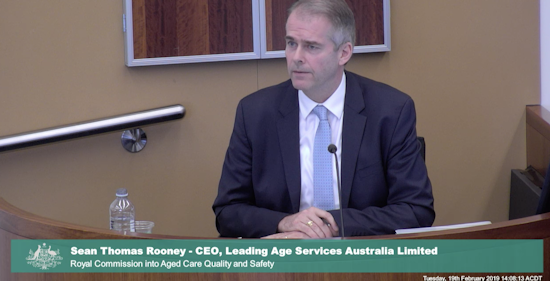ROYAL COMMISSION: Funding “not sustainable”, compassion crucial to effective care
Concerns around ineffective funding models and workforce skills mix were heard at the Royal Commission hearings yesterday afternoon.

LASA CEO Sean Rooney gives evidence at the Royal Commission yesterday.
Leading Age Services Australia Chief Executive Officer (CEO) Sean Rooney says he has been “shocked and saddened” by failures in Australia’s aged care system.
“These failures are unacceptable and I am sorry for the hurt that this has caused,” he says.
“My aspiration is to realise a better aged care system for our country and there are countless examples of passionate professional individuals and organisations that do this every day.”
Counsel assisting Dr Timothy McEvoy questioned Mr Rooney about LASA’s successful lobbying attempts to make new aged care quality standards more vague and its suggestion to remove a requirement for air conditioning in nursing homes.
Asked whether LASA believes it’s unnecessary for nursing homes to have mandatory cooling, Mr Rooney says that is not the case. He says LASA was merely seeking “clarification” of the standards and that nursing homes “should have appropriate…cooling and heating to meet the needs to provide a comfortable environment”.
“What we sought in our response in the consultation process was clarification, if this now required all residential aged care facilities to install air conditioning. That was just – it was not an objection to the standard,” he says.
On the topic of restraints in residential facilities, Mr Rooney says it a “serious issue”.
“It needs to be a last resort,” he says. “There are a number of things that can be done to de-escalate a situation before you would use restraint. It must be applied with consent, it is a clinical decision in most cases, and it needs to be properly monitored.”
Mr Rooney says he conducted a “snap survey” to gain insight into the use of psychotropic drugs in LASA members’ facilities which showed, at the time, around 30 percent of members’ residents were being prescribed those medications.
He says information was then provided to members about appropriate use, but was unable to say whether use had increased or decreased, as LASA had not previously requested that information from its members.
Compassion and whole-person approach crucial in care
Mr Rooney says he has struggled to come to terms with the “paradox” between rising patient needs and reduction in registered and enrolled nurses, saying a focus on “holistic” care and skills development would greatly benefit residents.
“Rather than focusing singly on clinical care, understanding (care) as a more broader set of outcomes, wholistic care or wellbeing, that requires…a range of other skills mix or inputs that deal with social, emotional, spiritual and others,” he says.
“What I would suggest is required here in order to deliver the best care outcome for older Australians in residential care, is to work up an evidence base through research to come up with a range of optimal models to meet all of those needs.”
Mr Rooney says compassion is the starting point of a strong and effective aged care workforce.
“We have professional and passionate workforce. If you talk to providers of these services, the first thing they’re looking for in their staff is the right temperament that has the compassion for care for others. Then there’s the adequate skills, qualifications and then it flows from there.
“At the heart of failures…would be a question of…the character of people involved. At times it could be the competency or qualification.”
Mr Rooney says he also supports calls for mandatory dementia training for aged care staff.
“For a personal care worker (in) ageing, (dementia training) is what’s known as a ‘core elective’. For a personal care worker in other categories, it is just an elective. We would argue that it should be a mandatory requirement for anybody working in aged care,” he says.
Consumer should call the funding shots
Catholic Health Australia (CHA) aged care director Nicholas Mersiades was critical of the current aged care funding models, saying commonwealth indexation of the controversial Aged Care Funding Instrument was “particularly harsh”.
“As a result, it is not keeping up; it is not faithful to price rises in comparable areas of the economy,” he said. “Understandably, providers are looking to maximise it as much as they can.”
Mr Mersiades says CHA has advocated for an independent approach to a funding model since the 2011 Productivity Commission Review.
“We would argue that the new (funding) instrument ought to be administered by an independent statutory authority of some kind rather than by the department or providers themselves,” he says.
Mr Mersiades says the current funding system is “not sustainable, plain and simple”.
“I’m trying to move away from an aged care system which is controlled and managed to the nth degree by the Government, and instead move to one where we have a genuine aged care service industry where it’s the consumer that calls the shots,” he says.
“I recognise that not every consumer and family is going to be as adapt and have the functionality to be able to be effective in that environment, and therefore we also need to have in place other appropriate consumer supports.”
Asked what structures he had in mind, Mr Mersiades proposes consumers pay more for their own care.
“Inevitably the conversation is going to have to go to the value of the land that people have their houses on because most wealth is in their home” he says.
“We’re not talking about the Government still not contributing the bulk of the cost of personal care and nursing care. It’s a question of increasing the contribution by those who can, rather than taking the view that every last dollar has to be preserved for inheritances.”
Representatives from UnitingCare, Aged Care Guild, Australian Medical Association and United Voice will give evidence today.























